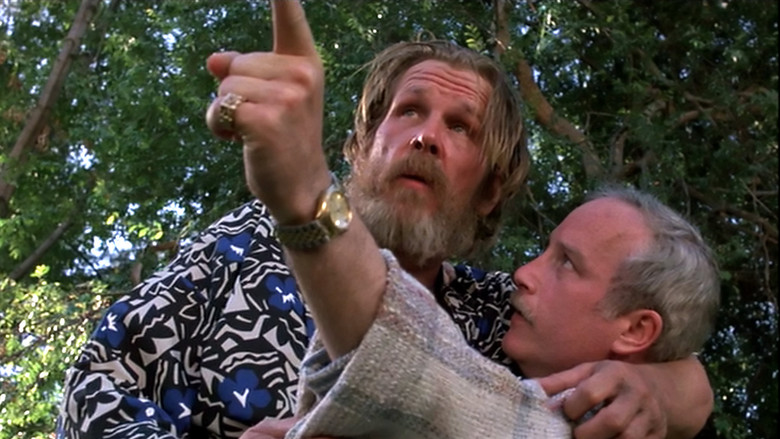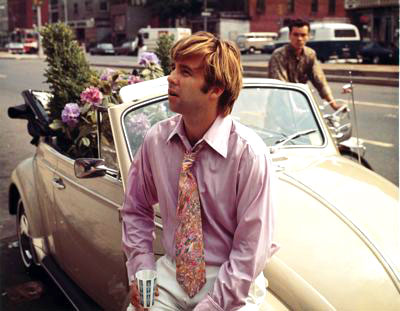David’s Movie Journal 11/6/11
Down and Out in Beverly Hills
I know Paul Mazursky as an actor more than a director. I’ve never seen Bob & Carol & Ted & Alice, possibly his most-discussed film. Scenes from a Mall and Moon over Parador I have vague adolescent memories of having caught in mid-afternoon weekend television broadcasts. Really, the only film in his directorial career that I know well is Harry and Tonto, a wonderful film from 1974 starring Art Carney (and a clear precursor to Alexander Payne’s About Schmidt). Based on the strength of that film alone, though, I was excited to see more.
Down and Out in Beverly Hills is a re-imagining of Jean Renoir’s 1932 Boudu Saved from Drowning. Both tell the story of a homeless person attempted suicide and being saved by a rich man with a kind heart and a less kind wife. Mazursky relocates the story from France to the mid-1980’s heart of bourgeois conspicuous consumption, Beverly Hills. Merely placing a haggard bum in the center of that neighborhood’s pastel opulence is an entrée to confront class boundaries and the wastefulness of wealth.
Mazursky’s surprising and wholly welcome tactic is to avoid meanness almost completely. By having the film’s chief representative of Beverly Hills be an essentially nice, if easily frustrated and slightly sheltered, man (played by Richard Dreyfuss in one of the best performances of his career), the director is able to gently point out and denounce the hermetic ignorance of the privileged without condemning the people themselves. He is ultimately a humanist.
Mazursky does add a few too many dollops of crowd-pleasing broad comedy and goes to the family dog for reaction shots one (or ten) too many times. Still, this film is a remarkable artifact of its era. Dated in the best way, it is a tableau of American society in one moment from which we can still learn today.
Miss Representation
Jennifer Siebel Newsom’s Miss Representation is a smart but amateurish documentary about the portrayal of women in the media and how it affects young girls growing up with its influence. As such, it’s a movie worth making. Despite the last ten years or so of the “metro-sexual” and the increased appliance of beauty standards to men as well as women, the balance is still way off (not to mention moving in the wrong direction – shouldn’t we be making women feel less insecure instead of making men more insecure?).
While ridiculous ideals of male beauty have become more commonplace (why does Dane Cook – a fucking stand-up comedian – need to be photographed with his shirt off?), they are still the exception to the rule. A man can become a famous movie star despite looking like Jonah Hill as long as he’s funny. For women in the movies, being talented comes in second to looking like Mila Kunis. And we’re lucky that Mila Kunis is at least funny. Sometimes we end up with Jessica Alba, who is not. Though it must be stated that this is partially due to women and men having different criteria for attraction, the lack of fairness is neither intellectually nor morally justifiable.
The problem with Newsom’s film is the fact that the two dashed off paragraphs I’ve just written are more nuanced than her arguments. She presents her footage – her evidence, if you will – in such a narrow context that her interpretation is only one that can fit. There is no discussion of the ways in which many women willingly and knowingly perpetuate this status quo, nor is there recognition of the post-Queer Eye male corollaries or the growing influence of third wave feminism and “post-feminism.” If it weren’t for the fact that Newsom uses clips from recent television shows and movies, this film could have been made in 1999.
The Landlord
Hal Ashby’s feature debut The Landlord should be considered an essential film. It’s a hilarious, honest and insightful comedy about race and class. It’s essentially, though, about the way America had changed by the end of the 1960’s and the people who both had and hadn’t caught up with that change.
Beau Bridges plays Elgar, the lazy son of a very wealthy white family. His version of deciding to do something with his life involves using his parents’ money to buy a tenement building in the Brooklyn ghetto and refurbish it, turning it into a house and getting in on the ground floor of gentrification. In order to do so, he must first evict the tenants, all of them black. This proves harder than he imagined and, in the delay, his plans begin to change as he becomes a part of the residents’ lives and they of his.
Back around the time I was in middle school and high school, there was a phrase that got used a hell of a lot. “Political correctness” was something to aspire to or mock, depending on who you were. My feelings fall somewhere in the middle. It was necessary to establish a baseline of respect in the way we discussed people in our multi-cultural nation. Unfortunately, it was often over-applied, having the effect of stifling honesty in favor of not hurting anyone’s feelings. This was obviously detrimental to real political discourse, since any significant change is bound to upset someone.
The Landlord is a stunning example of what could be done in a pre-PC era. Though the film is not racist, it is also not genteel about the ways people talk and think about races other than their own. It can be hard, at times, to cheer on Elgar’s growth because, even as he becomes a better person, he often treats his new black friends as little more than symbols of his having become a better person. This is particularly true whenever he goes back home and, almost immediately, the generalizations begin to creep back into his speech. This frankness about even the characters we’re supposed to like is startling and far too rare in American cinema.
Luckily, the film is less selfish than Elgar. We are, as the story goes on, increasingly allowed to see people as individuals within a particular system or other and not just the system itself. It is, as I said above, an essential film. And I haven’t even mentioned the most important part. It’s incredibly funny.































